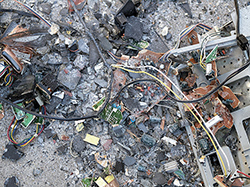 Photo by: takomabibelot | Flickr.com
Photo by: takomabibelot | Flickr.comA recent article by Drew Hendricks on National Geographic’s site, entitled “Green Jobs and Other Benefits of E-waste Recycling,” not only propounds the threat of electronic waste on our environment but raises several other unexpected benefits.
The Article
Hendricks begins his article by drawing out the life cycle of electronic waste for his readers. Simply by tossing an iPod in the trash, you could be contributing to the release of toxic pollution into the soil, air, and water of wherever the device is dumped – which is often a developing country overseas.
While Hendricks admits that efforts are being made to recycle e-waste in the U.S. and abroad, the eight hundred thousand tons of e-waste purportedly being processed in India each year are rarely reaching government-registered recycling firms. As such, this waste is not necessarily being recycled responsibly, in terms of either the environment or laborer health. Similarly, according to a United Nations Environment Programme survey, very little of the over one million tons of electronic waste landing in China is handled in proper recycling facilities.
The Environmental Benefits
While they may seem obvious, the environmental benefits of electronic recycling are always worth repeating – even according to Hendricks. These benefits include:
1) Preserving our natural resources
Electronic waste is often comprised of precious metals, like gold, silver, and platinum, as well as valuable copper, aluminum, and iron. These metals are denoted as “precious” and “valuable” for a reason – well, two reasons. 1. They are in limited supply. 2. We rely on them for a surprising range of functions, from simple tinfoil to NASA’s rocket ships. Recycling electronic waste protects these metals for future use and impedes their endangerment.
It should also be noted that recycling e-waste can save up to 70% on the energy required to mine and process new materials. Savings in energy means savings in costs and precious power resources.
2) Cutting contamination
In addition to valuable metals, electronic waste can be home to hazardous chemicals like lead, mercury, chemical flame retardants, beryllium, and chromium. As electronics breakdown in landfills, these chemicals are released into the surrounding soil, water, and air, affecting the health and comfort of citizens in surrounding areas.
The Economic Benefits
If saving the earth isn’t enough to perk your ears, there’s a good chance saving money is. In addition to bettering the quality of the Earth, electronic recycling can benefit the many economies currently struggling around the world, including our own.
1) Jobs! Jobs! Jobs!
Our nation, as well as our neighbors, are suffering from higher-than-ever unemployment rates. As e-waste is an enormous concern, both figuratively and literally (remember millions of tons?), its demise will require a large army of strength. Jobs in the electronic waste recycling sector could stem from professional refurbishing and recycling services, as well as large scale cleanup efforts.
2) Minimizing Costs
As previously mentioned, America currently sends most of its electronic scrap overseas. How does it get there? Via gas-guzzling, taxpayer funded air carriers. By replacing oversea landfills with in-nation recycling plants, we won’t only be saving the third world from further chemical pollution, but putting our tax dollars somewhere better.
3) Financial Incentives
Pressure from environmentalist groups has led to electronics manufacturers offering incentives for electronic waste recycling, like buy-back offers on old electronic goods. The buy-back model allows the manufacturer to cut costs in obtaining new raw materials and offers the consumer a reduced price. Talk about a win-win!
While it may seem like an enormous undertaking, tackling our electronic-waste epidemic begins with our own small efforts. Locate an electronics recycler or buyer, like Cash for Electronic Scrap, and make a contribution to a better earth and economy.




